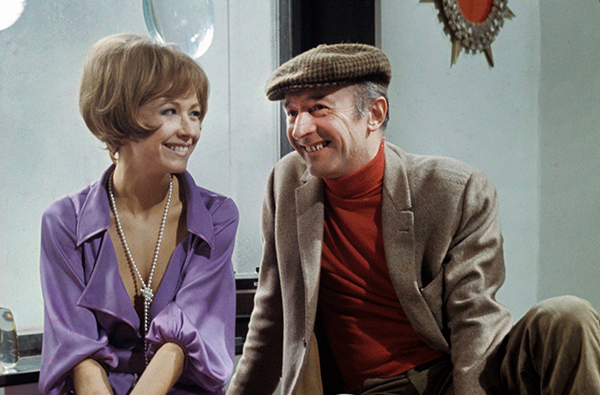Star
Marlène Jobert, the prodigious decade
PostED ON 20.10.2022
Having retired from the screen, she accepted the invitation of the Lumière Film Festival to talk about a career that combined skill and popular success.
‘Les Cigognes n'en font qu'à leur tête’, was her final film. She had made her decision; in 1989, after the release of the comedy by Didier Kaminka, Marlène Jobert turned her back on the big screen and went off to watch her daughters grow up, then to write children's stories she’d dreamt about when she was a little girl and not sufficiently happy. Like Mireille Darc, Marlène Jobert belongs to that post-war generation of French actresses who were first and foremost physical, natural, childlike women with a charming tomboyish streak. They were ingénues, but not overly so, rapidly able to hold their own with the older men of the time, from Blier to Ventura, portraying an entertaining resistance on screen.
Michel Audiard was one of the first to be charmed by Marlène's playfulness when preparing ‘Don’t Take God’s Children for Wild Geese’: "I wanted to try and add a note of humour to the eroticism, which is very boring, and I think I have found the perfect actress for this kind of trapeze act. I didn't know her a fortnight ago, and I saw Yves Robert's film ‘Very Happy Alexander’. You always have the impression that she is not listening to you, but in fact she understands better than anyone else. She is a great actress and I wish her great things in her career.” She thanks Audiard again: "I didn't know I had this kind of comic nature".
Dominique Besnehard's documentary, presented at the festival, looks back at her critical childhood, after her family left Algeria and her first years in Dijon, with a military father who was a bit too fond of the martinet for her taste. Yet it was this same father who was soon thrilled to see his eldest daughter enter the Conservatory. "I was lucky right away; I hadn't been there for a year before I found myself in the theatre with Montand.”

Marlène Jobert and Michel Audiard 1968
Luck would have its opposite side - Montand turned out to be anything but charming for her. In the memoir ‘Les Baisers du soleil’ (2014), she described him as having "two neurons, one for being mean, the other for being stupid". In the cinema, her first appearance was in ‘Masculine Feminine’ by Jean-Luc Godard, with another debutante, Chantal Goya. Again, she has mixed memories, foolishly believing that being the ‘director’ implied giving his actors ‘directions’, which JLG obviously didn’t do. Marlène had previously even demanded a script.
The experience nevertheless provided a crash course for the woman who suffered from her modest origins and lack of culture. However, luck would return at a triple gallop with ‘Astragale’, featuring a golden role as a young woman who escapes from prison, which became one of the hits of 1968. The energy she displayed on screen, the determination, so modern and so uncommon in female roles at the time, made her a force to be reckoned with, as in José Giovanni's ‘Last Known Address’, playing a police assistant to Lino Ventura, who was revitalised by the dynamism of the young girl.
This was followed by René Clément's ‘Rider on the Rain’, co-starring Charles Bronson, in which Marlène Jobert, as a ‘wonderful liar’, became an adored actress, a mixture of fragility and impressive strength. The way was clear for years to come: Rappeneau (‘The Scoundrel/ Swashbuckler’), de Broca (‘Touch and Go’) and then Chabrol (‘Ten Days Wonder’) alternately illustrated her true and communicative talent. Up until ‘The Police War’ (1979), she led an exemplary career. The public loved her, clamoured for her. But it soon became overwhelming. "Five films in fourteen months is madness," she says. “I succeeded too quickly and didn't have the time to mature.” Suddenly, a career as a children's author would open up and she would find gold at the end of her pen… a quill of wild geese feathers, of course.
Carlos Gomez
Master class
A conversation with Marlène Jobert
Pathé Bellecour Thu. 20 at 3pm
Screenings introduced by Marlène Jobert:
C’est moi... Marlène Jobert a documentary by Dominique Besnehard: Friday, October 21 at 12pm at the Villa Lumière
Nous ne vieillirons pas ensemble: Thursday, October 20 at 5:15pm at Pathé Bellecour
Le Passager de la pluie: Friday, October 21 at 10:30am at the Institut Lumière

